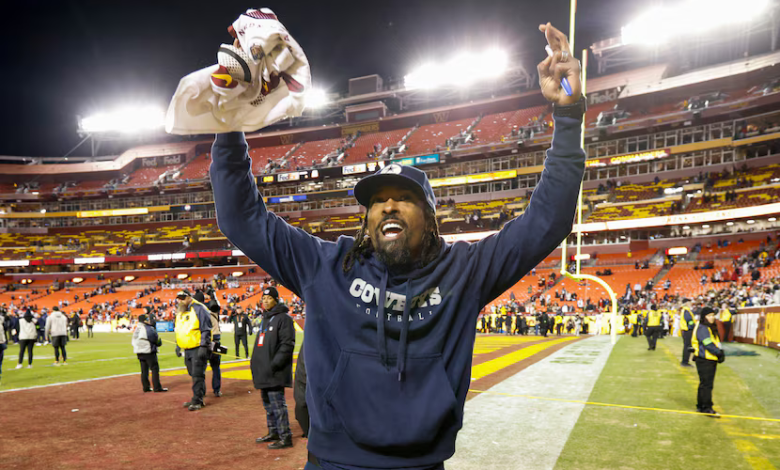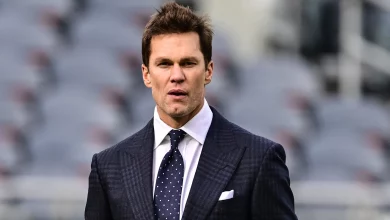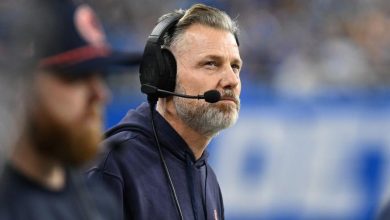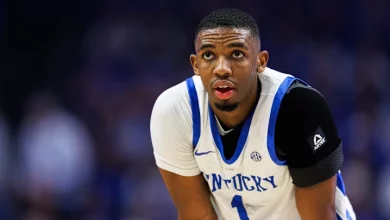Al Harris is the star of the Cowboys’ most recent coaching departures.

In the fast-paced, high-pressure world of the NFL, coaching changes are almost as significant as player acquisitions. For teams like the Dallas Cowboys, with a fan base that expects nothing less than a Super Bowl every season, each decision made in the coaching ranks is scrutinized to the highest degree. Over the years, the Cowboys have witnessed various shifts in their coaching staff, some of which have shaped the team’s trajectory more than others. Recently, the team experienced a flurry of coaching departures, but one individual’s exit stands out among the rest: Al Harris.
Al Harris, formerly the Cowboys’ cornerbacks coach, became the focal point of this latest round of departures. His impact on the Cowboys’ defense was substantial, yet his departure from the team has left fans and analysts alike questioning what this means for the team’s future and for the direction of their defensive schemes. Harris was widely respected as a rising star in the coaching ranks, and his loss raises important questions about the stability and long-term vision for the Cowboys.
This article will dive deep into Harris’ role with the Cowboys, what he brought to the team, and why his departure is such a pivotal moment for the franchise. We’ll also explore the broader implications of his exit, including the effect it has on the team’s defense, the coaching staff, and the leadership under Jerry Jones and head coach Mike McCarthy.
Al Harris’ Impact on the Cowboys’ Defense
When Al Harris joined the Cowboys as their cornerbacks coach, it didn’t take long for him to make an impact. As a former NFL cornerback, Harris was uniquely positioned to understand the ins and outs of playing in the secondary. His playing career, which included stints with the Green Bay Packers and Miami Dolphins, gave him the credibility and experience to relate to his players in a way that few other coaches could.
1. Development of Young Talent: Trevon Diggs and Kelvin Joseph
One of the most significant aspects of Harris’ coaching tenure was his role in the development of cornerbacks, most notably Trevon Diggs and Kelvin Joseph. Diggs, who quickly became one of the premier cornerbacks in the NFL after being drafted by the Cowboys in 2020, flourished under Harris’ tutelage.
Harris helped Diggs develop his ball skills, teaching him how to read quarterbacks and anticipate throws in a way that allowed him to become one of the league’s most disruptive defenders. By his second season, Diggs had emerged as one of the NFL’s top playmakers, finishing with 11 interceptions in 2021. His ability to make game-changing plays, combined with his coverage skills, can be attributed in no small part to Harris’ coaching. Harris instilled in Diggs the mindset of being aggressive but disciplined, recognizing when to take risks and when to play it safe. That duality helped elevate Diggs into one of the most dangerous cornerbacks in the game.
Harris also worked with Kelvin Joseph, another promising but raw talent. Joseph showed flashes of potential, though his consistency on the field was still developing. Harris’ ability to work with younger players, build confidence, and improve their skills was invaluable for Joseph’s growth, and it seemed like he was on the verge of making significant strides.
Under Harris’ leadership, the Cowboys’ cornerback room was among the most dynamic in the league. His reputation for developing young talent made him an indispensable part of the coaching staff.
2. Tactical Acumen and Game Planning
Beyond individual player development, Harris was instrumental in helping the Cowboys’ defense implement tactical game plans. As a cornerbacks coach, he wasn’t simply responsible for instructing players on the fundamentals of the position, but also for helping the defensive coordinator devise strategies that leveraged his players’ strengths.
With Harris’ influence, the Cowboys’ secondary became adept at playing both man and zone coverage, enabling them to adapt to a wide range of offensive schemes. His understanding of how to manipulate opposing quarterbacks, disguise coverages, and create confusion in the passing game helped the Cowboys become one of the most feared defensive units in the NFL. It was clear that Harris was not just a coach, but a strategist who could read the game and adjust accordingly.
Why Al Harris’ Departure Is So Significant
Harris’ departure from the Cowboys raises several important questions and presents unique challenges for the team moving forward. His exit isn’t just about losing a respected coach; it’s about the impact his absence could have on the defense, the team’s overall coaching stability, and the larger cultural shift within the Cowboys’ organization.
1. A Blow to the Secondary’s Continuity
The most immediate impact of Harris’ departure is the disruption it causes within the Cowboys’ secondary. The Cowboys have developed one of the top cornerback tandems in the NFL with Trevon Diggs and Anthony Brown under Harris’ leadership. Harris was a key figure in building chemistry within the secondary and fostering a unit that could execute at a high level.
With Harris gone, the Cowboys now face the task of finding a replacement who can maintain that continuity and keep the defensive backfield on track. The cornerback position is one of the most vital on any defense, and given the Cowboys’ reliance on their secondary to generate turnovers and defend against explosive passing games, losing Harris creates a gap in leadership that may take time to fill.
While the Cowboys have a deep pool of talented defensive backs, including young players like Nashon Wright, the departure of Harris could stall the progression of these players if the team doesn’t find a suitable replacement. Whether the Cowboys hire from within or look outside the organization, the pressure to maintain the defense’s high level of play in the secondary will be a significant challenge.
2. Coaching Instability: A Pattern Emerging Under Jerry Jones
Harris’ departure is also part of a broader trend of instability in the Cowboys’ coaching ranks. Under Jerry Jones’ ownership, the Cowboys have often seen high turnover in their coaching staff, particularly in recent years. While Jones has remained steadfast in his commitment to Mike McCarthy as the team’s head coach, the constant shuffling of assistants has led some to question whether the franchise has been able to build a sustainable coaching staff that can execute long-term plans.
The loss of Harris, a coach who had clearly earned respect within the locker room and who was developing players effectively, adds to the growing concerns about the Cowboys’ coaching turnover. Although McCarthy himself has held steady, the frequent departures of key position coaches like Harris create a sense of unpredictability, which can undermine the team’s ability to develop young players and establish consistent systems across the board.
3. Jerry Jones’ Decision-Making: A Double-Edged Sword
Al Harris’ departure also reflects Jerry Jones’ decision-making, which, as always, has been a subject of scrutiny. Jones is known for his willingness to make bold moves, but this sometimes leads to controversial decisions. For instance, while Jones is lauded for making aggressive moves to acquire top-tier talent, such as the trade for Minka Fitzpatrick or his willingness to invest in high-profile players like Micah Parsons, his decisions regarding coaches have been less predictable.
Jones’ penchant for overseeing the team’s coaching hires and, at times, micromanaging can create challenges. In this case, the decision to part ways with Harris could have been influenced by a desire for change, but it leaves fans wondering whether this decision is in line with the team’s long-term goals. While change can often lead to fresh perspectives, the Cowboys have struggled to maintain stability at key coaching positions for years, and Harris’ departure only fuels this narrative.
4. The Need for a Visionary to Continue the Development
Harris was not just a position coach; he was a visionary who contributed to the identity of the Cowboys’ defense. His ability to mold young cornerbacks into capable starters and his ability to adjust game plans based on the talent at his disposal made him a standout on the coaching staff. In his absence, the Cowboys must find someone who not only possesses technical coaching skills but who also has the ability to continue Harris’ work in developing the next generation of defensive backs.
If the Cowboys are to remain a top-tier defensive team, they’ll need to ensure that whoever replaces Harris is capable of continuing his emphasis on both individual development and tactical execution. Losing a coach who has shown such an ability to combine these elements could set the defense back, potentially stalling the Cowboys’ championship aspirations.
What Comes Next for the Cowboys?
As the Cowboys move forward without Al Harris, the team faces a crossroads in both its coaching and defensive strategy. The loss of Harris represents a significant challenge for the team, but also an opportunity to find new leadership that can build on the foundation he helped create. Harris’ impact on the Cowboys’ secondary and his ability to develop young talent was invaluable, and his absence will undoubtedly be felt.
For Jerry Jones, this coaching departure marks another chapter in his ongoing tenure as owner of the Cowboys. While his decisions have often been bold and controversial, the question remains whether this particular change was one made out of necessity or impulsiveness. For the Cowboys to succeed, the team must find a suitable replacement for Harris, someone who can continue the excellent work he did with the secondary and who can integrate seamlessly into a team that already has championship-caliber potential.
Ultimately, Al Harris’ departure will force the Cowboys to reflect on the continuity of their coaching staff and consider whether the team is on the right track to achieve its ultimate goal of a Super Bowl championship. In the ever-competitive NFL, where stability often leads to sustained success, the Cowboys’ next steps will be crucial.









